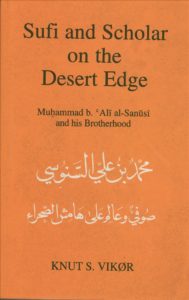
Sufi and Scholar on the Desert Edge: Muhammad B. Ali al-Sanusi and his Brotherhood
Knut S. Vikor
Hurst (1995)
Rs6370
The Sanusiya was one of the most influential Islamic movements in North Africa and the Sahara in the nineteenth Century. Its basis was laid by Maghrebi scholar Muhammad b. Ali al-Sanusi (1787-1859). From a background of studies in Sufism and Islamic law, he traveled and studied throughout the Islamic world before settling in Libya to found a new Sufi brotherhood dedicated to the development and spread of Islam among the Saharan Beduins. But the brotherhood’s success in organizing the desert peoples eventually transformed it from scholarly and spiritual pursuits into a protector of Saharan trade and defender of Islam. Sufi and Scholar on the Desert Edge focuses on the intellectual tradition that formed al-Sanusi, and also presents his writings and an overview of the Sanusiya order in the mid-nineteenth century.
Knut S. Viktor, director of the Center of Middle Eastern and Islamic Studies, University of Bergen, Norway, is editor of Sudanic Africa: A Journal of Historical Sources.
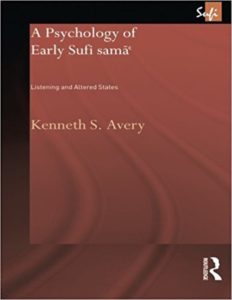
A Psychology of Early Sufi Samâ`: Listening and Altered States
Kenneth S. Avery
Routledge (2004)
Rs9342
Avery explores the psychology of altered states among the early Sufis. It examines samâ` - listening to ritual recitation, music and certain other aural phenomena - and its effect in inducing unusual states of consciousness and behaviours. The focus is on the earliest personalities of the Islamic mystical tradition, as mediated by texts from the tenth to the twelfth centuries C.E. These unusual states are interpreted in the light of current research in Western psychology, and also in terms of their integration into historical Islamic culture.
A Psychology of Early Sufi Samâ` provides new insights into the work of five Sufi authors, and a fresh approach to the relation between historical accounts of altered states and current psychological thinking.
Kenneth S. Avery is a specialist in Sufi studies and Persian literature. He is a musician and a recent Ph.D. graduate in Islamic Studies from the University of Melbourne, Australia.
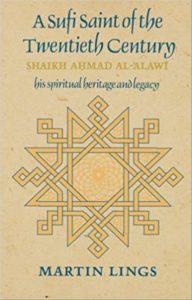
A Sufi Saint of the Twentieth Century: Shaikh Ahmad al-Alawi
Martin Lings
Islamic Texts Society (1993)
Rs2632
Almost a prerequisite for any serious study of Sufism in European languages’: this was the verdict of Seyyed Hossein Nasr in his review of the first edition of the book. According to the Journal of Near Eastern Studies, it is ‘one of the most thorough and intimately engaging books on Sufism to be produced by a Western scholar’.
ertainly there is nothing second-hand about it. The author lets Sufis speak for themselves and, in a series of unusual and absorbing texts mainly translated from Arabic, he gives a vivid picture of life in a North African Sufi order. Against this background stands the unforgettable figure of the Algerian Shaikh who was head of the order from 1909 until his death in 1934. The last few chapters are mainly devoted to his writings, which include some penetrating aphorisms, and which end with a small anthology of his remarkable mystic poems.
Martin Lings, formerly Keeper of Oriental Manuscript in the British Museum and the British Library, is the author of three works on Islamic mysticism, ‘Sufi Poems’, ‘What is Sufism?’ and ‘The Book of Certainty’, as well as the award-winning ‘Muhammad: His Life Based on the Earliest Sources’ all published by the Islamic Texts Society.
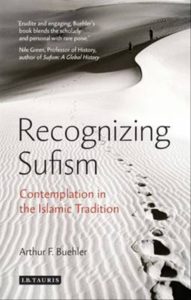
Recognizing Sufism: Contemplation in the Islamic Tradition
Arthur F. Buehler
I.B.Tauris (2016)
Rs2546
Sufism is all too often associated just with ‘mysticism’ in the West. The author of this new textbook, a former pupil of Annemarie Schimmel, suggests that conflating Sufism and mysticism is only partially valid. He shows that the vast majority of Sufi practice, both historically and in the contemporary world, has little or nothing to do with a esoteric transcendence but is rather focused on contemplative activity. Such practice might involve art, music, devotional shrine visitation - even politics and psychology. Placing Sufism in a wider Islamic contemplative context enables Arthur F Buehler to examine Sufi history, as well as current application, against a backdrop that is richer and more inclusive than that portrayed in many competing introductory surveys. Discussing the origins of Sufism; the development of Sufi lineages (via three founder figures); Sufi lodges and the role of Sufism in colonial resistance; Sufi poetry; Sufi shrines, and Sufism in the West, the author rescues his topic from the idea that it means only union with the divine. In this original new treatment, Sufism emerges as complex and multi-layered.
Arthur F Buehler is Senior Lecturer in Religious Studies at Victoria University of Wellington and Senior Editor of the Journal of the History of Sufism. He is the author of several books which include Sufi Heirs of the Prophet: The Indian Naqshbandiyya and the Rise of the Mediating Sufi Shaykh and Revealed Grace: The Juristic Sufism of Ahmad Sirhindi, 1564-1624.
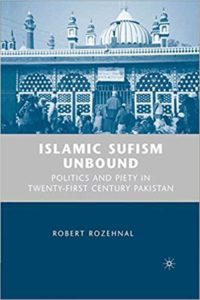
Islamic Sufism Unbound: Politics and Piety in Twenty-First Century Pakistan
R. Rozehnal
Palgrave Macmillan (2007)
Rs3397
Robert Rozehnal traces the ritual practices and identity politics of a contemporary Sufi order in Pakistan: the Chishti Sabris. He takes multiple perspectives from the rich Urdu writings of Twentieth Century Sufi masters, to the complex spiritual life of contemporary disciples and the order’s growing transnational networks.
‘Neither institutional Sufism nor Pakistani politics have ever been put in direct conversation as nimbly as they are in this masterful study by Robert Rozehnal. Few who care about identity politics or Muslim religious vitality - beyond the headlines of extremism or Islamism can ignore this well crafted, and insightful, book.’ (Bruce Lawrence, Nancy & Jeffrey Marcus Humanities Professor of Islamic Studies and Director, Duke Islamic Studies Center).
‘Islamic Sufism Unbound is a pathbreaking analysis of the role of religion and mysticism in the contemporary world. The story of the Sabiri Chishti Sufi order and its engagements with modernity and the nation-state is absorbing and in many respects surprising. Robert Rozehnal draws upon detailed ethnographic accounts as well as an extensive knowledge of the Sufi tradition to present this important case study of Sufism and Islam today.’ (Carl W. Ernst, William R. Kenan, Jr. Distinguished Professor of Religious Studies, University of North Carolina, Chapel Hill)
‘Islamic Sufism Unbound is a tour de force that unravels the multiple layers of spiritual practice in modern Muslim societies. Rozenhal shows the salience of religious practices in modern urban centers in south Asia and beyond and how it impacts various aspects of human life from intimate personal meditations to the most exuberant public performances; how religious practices frame both nationalism and transnational identities and how it tangibly impacts politics and economics. Throughout the Muslim world there are many figures and communities similar to those examined in this wonderfully written book, which deserve great scholarly and public attention in order to further the public understanding of transnational Islam. Rozehnal has paved a way forward with the commendable critical insights he sheds on the subject matter in order to illuminate the complexity of religious practice.’ (Ebrahim Moosa, Associate Professor of Islamic Studies, Duke University and Associate Director, Duke Islamic Studies Center, US)
R. Rozehnal is Assistant Professor, Department of Religious Studies, Lehigh University, USA.

